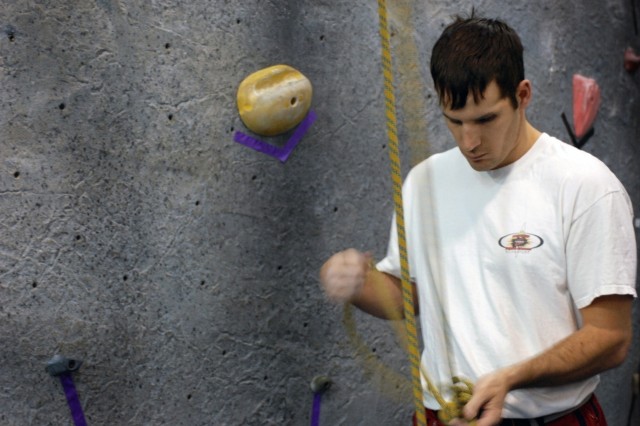WASHINGTON (Army News Service, July 14, 2008) - Capt. Scott Smiley brings new meaning to the section of the Warrior Ethos that reads "I will never quit."
Blinded by a suicide blast in Mosul, Iraq, in April 2005, he hasn't let his injuries stop him from remaining in the Army, pursuing a master's in business administration at Duke University in North Carolina or climbing Mount Rainier in Washington state in July 2007.
The 14,410-foot climb, which only half of about 10,000 annual climbers actually complete, according to the "Seattle Post-Intelligencer," earned Smiley a nomination as "Best Outdoor Athlete," for the 2008 ESPY awards.
The ESPY awards are put on annually by ESPN to recognize outstanding athletes. Nominees in other categories include golfer Tiger Woods and Brett Favre of the Green Bay Packers. This year's awards will be hosted by singer Justin Timberlake, and are scheduled to run at 9 p.m. EST, July 20, on ESPN.
"I'm still surprised," said Smiley, who is also the 2007 "Army Times" Soldier of the Year. "One of my friends was watching ESPN and he said that I had been put up for the ESPY and I didn't believe him. Then another friend called me and said, 'yeah, you have.' And then my brother actually checked on the Internet and there was my name. I was contacted by ESPN the next day, letting me know that I was nominated for the ESPY and I'm still in shock.
"For me, it's an amazing award just to be nominated. But I have no clue who (nominated me) or why I was nominated. I don't necessarily believe that I should be up for the ESPYs and be compared to all these other amazing athletes."
Smiley actually didn't start mountain climbing until after he was injured, but said that while he was stationed at Fort Lewis, Wash., with the 25th Infantry Division, he used to stare at Mount Rainier in the distance and think about climbing it one day. So when a friend offered him the opportunity to reach the summit as part of Camp Patriot, a nonprofit that takes disabled veterans on outdoor adventures, Smiley jumped at the chance.
"It's a challenging climb," he said. "I know a gentleman died a couple months ago, about 500 feet below Camp Muir. Just the wind and the snow that can begin falling, you always are having to watch the weather, and it is dangerous, but if you're an in-shape person and you can hike decently well or just walk, you can take as many days as you want or you can do it in several hours. It's a fun climb."
Smiley made few, if any, concessions for his blindness, saying it didn't impact his training, which included weight-training, stair machines, running and a few practice climbs in the Colorado mountains. Making such a dangerous climb without being able to see where he was going, was a little unnerving, however.
"You followed the person in front of you," he said. "You heard their footsteps and I had two hiking poles, one in each hand. That kind of gave me the ability to keep my balance. But it was difficult taking one step after the other, when you didn't know what was ahead of you, whether it was rock, how high the rock was, if it was a slippery rock, how slippery the ice or snow was, if it was going to give. So each step was very difficult in the sense that you used your whole body to balance yourself and you still had the same amount of weight on your back. Other than just great balance, it's an enjoyable climb."
Reaching the summit, he added, was amazing, and one of the things that have truly made him miss his sight.
"One of the things I miss most, missing my eyesight, is the beauty of looking over and seeing Mount Hood, seeing the Olympic Mountains in the distance, watching the sun rise and the sunset; that's definitely something that I miss," he said. "But being able to have it described to me and just the awesomeness of the view and the mountain, everything that you were able to see, it's absolutely gorgeous.
"It was a relief that I had made it and there's a joy that I had accomplished something that not a lot of people have without sight. It's just something that I thank God for giving me the ability and my body the ability to do," Smiley said of the climb, which lasted a total of three days.
Smiley is slated to teach cadets at the U.S. Military Academy at West Point, N.Y., after finishing his master's in 2009, a process eased by a program called JAWS, which reads everything on his computer screen out loud. He still uses a standard keyboard for typing.
He believes he still has something to offer the military, he said, and doesn't want to squander his expensive West Point education, paid for by the U.S. government and taxpayers, while he can still be of service.
"I believe that injured Soldiers should still be treated like they are Soldiers and can do the job," said Smiley. "There are millions of jobs in the military that Soldiers can still do even though they have a disability. There's thousands of jobs that Soldiers can do that don't require them to deploy. So that was a main reason, but my wife and I, we love the military, we love what the military's doing right now and we believe what we're doing is the right thing."
"All-in-all, I don't think I'm deserving of any of these things, but I give my thanks to God that he has blessed me," he concluded. "Even though my eyesight was taken away, I think my eyes have been opened."


Social Sharing